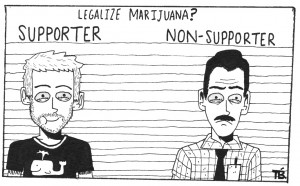 Unaware of its medical benefits and blinded by the federal government’s view of right versus wrong, some consider marijuana a joke. Federal law still considers marijuana more dangerous than cocaine and methamphetamine. The DEA classifies it as a schedule 1 drug, signifying a belief that marijuana has no medicinal value and can lead to potentially severe psychological or physical dependence.
Unaware of its medical benefits and blinded by the federal government’s view of right versus wrong, some consider marijuana a joke. Federal law still considers marijuana more dangerous than cocaine and methamphetamine. The DEA classifies it as a schedule 1 drug, signifying a belief that marijuana has no medicinal value and can lead to potentially severe psychological or physical dependence.
Unlike an array of other schedule 1 substances, cannabis has been approved in 21 states and Washington D.C. for medicinal purposes. Two states, Washington and Colorado, have even gone as far as legalizing it for recreational use.
On Friday, Jan. 24 a ballot that would legalize medical marijuana in Florida gathered over one million signatures and will be presented to voters next fall. According to a Quinnipiac University poll, 82% of Florida voters support the legal use marijuana for medical use by adults if prescribed by a doctor.
By the end of 2014, the “Green Rush” currently sweeping across the west coast could be coming to Florida.
More conservative Floridians against legalization might be nervous for the 2014 vote, but for the millions that have waited years for their medicine to become legal, the vote can’t come fast enough.
“I hate that I can’t just get my medicine legally,” says a Timber Creek graduate and current Full Sail student. “I think medical marijuana should have been legalized a long time ago. It works better than the prescription my doctors give me and it’s safer. I can’t overdose.”
This alumnus with the neurological disorder epilepsy, experiences seizures that range from completely unnoticeable to stretches of relentless shaking. Many people are unaware of just how many conditions cannabis can help treat.
Marijuana has been known to help people with serious conditions like HIV/AIDS, Alzheimer’s disease, cancer, epilepsy, anorexia, Crohn’s Disease, glaucoma, multiple sclerosis, fibromyalgia, Parkinson’s disease, Huntington’s disease, and Tourette’s syndrome. However, marijuana has also been used to treat lesser issues like nausea, anxiety, depression, migraine headaches, pain, insomnia, and arthritis.
Clearly marijuana is a viable option for patients across the state, and Florida would benefit both medically and economically if voters say “yes.” By alleviating pain and painful symptoms, creating jobs, and filling vacant retail spaces with dispensaries, an influx of tax money will benefit our state.
With hope for legalization once just a distant dream, Floridians can now see legalization as a serious possibility. With the political push for marijuana over the last 10 years creating a “Green Rush” that has finally touched Florida, it is no longer a question of if medical marijuana will be legalized, but when.